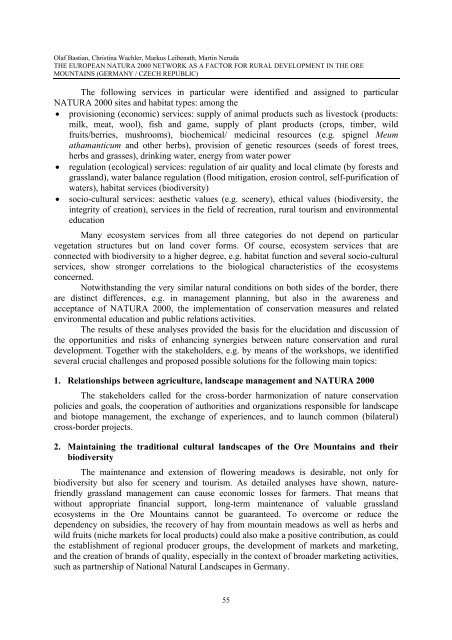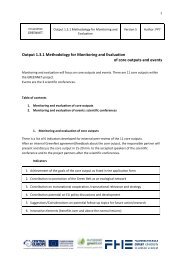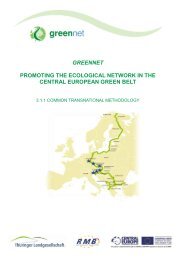The Green Belt as a European Ecological Network strengths and gaps
The Green Belt as a European Ecological Network strengths and gaps
The Green Belt as a European Ecological Network strengths and gaps
Create successful ePaper yourself
Turn your PDF publications into a flip-book with our unique Google optimized e-Paper software.
Olaf B<strong>as</strong>tian, Christina Wachler, Markus Leibenath, Martin Neruda<br />
THE EUROPEAN NATURA 2000 NETWORK AS A FACTOR FOR RURAL DEVELOPMENT IN THE ORE<br />
MOUNTAINS (GERMANY / CZECH REPUBLIC)<br />
<strong>The</strong> following services in particular were identified <strong>and</strong> <strong>as</strong>signed to particular<br />
NATURA 2000 sites <strong>and</strong> habitat types: among the<br />
provisioning (economic) services: supply of animal products such <strong>as</strong> livestock (products:<br />
milk, meat, wool), fish <strong>and</strong> game, supply of plant products (crops, timber, wild<br />
fruits/berries, mushrooms), biochemical/ medicinal resources (e.g. spignel Meum<br />
athamanticum <strong>and</strong> other herbs), provision of genetic resources (seeds of forest trees,<br />
herbs <strong>and</strong> gr<strong>as</strong>ses), drinking water, energy from water power<br />
regulation (ecological) services: regulation of air quality <strong>and</strong> local climate (by forests <strong>and</strong><br />
gr<strong>as</strong>sl<strong>and</strong>), water balance regulation (flood mitigation, erosion control, self-purification of<br />
waters), habitat services (biodiversity)<br />
socio-cultural services: aesthetic values (e.g. scenery), ethical values (biodiversity, the<br />
integrity of creation), services in the field of recreation, rural tourism <strong>and</strong> environmental<br />
education<br />
Many ecosystem services from all three categories do not depend on particular<br />
vegetation structures but on l<strong>and</strong> cover forms. Of course, ecosystem services that are<br />
connected with biodiversity to a higher degree, e.g. habitat function <strong>and</strong> several socio-cultural<br />
services, show stronger correlations to the biological characteristics of the ecosystems<br />
concerned.<br />
Notwithst<strong>and</strong>ing the very similar natural conditions on both sides of the border, there<br />
are distinct differences, e.g. in management planning, but also in the awareness <strong>and</strong><br />
acceptance of NATURA 2000, the implementation of conservation me<strong>as</strong>ures <strong>and</strong> related<br />
environmental education <strong>and</strong> public relations activities.<br />
<strong>The</strong> results of these analyses provided the b<strong>as</strong>is for the elucidation <strong>and</strong> discussion of<br />
the opportunities <strong>and</strong> risks of enhancing synergies between nature conservation <strong>and</strong> rural<br />
development. Together with the stakeholders, e.g. by means of the workshops, we identified<br />
several crucial challenges <strong>and</strong> proposed possible solutions for the following main topics:<br />
1. Relationships between agriculture, l<strong>and</strong>scape management <strong>and</strong> NATURA 2000<br />
<strong>The</strong> stakeholders called for the cross-border harmonization of nature conservation<br />
policies <strong>and</strong> goals, the cooperation of authorities <strong>and</strong> organizations responsible for l<strong>and</strong>scape<br />
<strong>and</strong> biotope management, the exchange of experiences, <strong>and</strong> to launch common (bilateral)<br />
cross-border projects.<br />
2. Maintaining the traditional cultural l<strong>and</strong>scapes of the Ore Mountains <strong>and</strong> their<br />
biodiversity<br />
<strong>The</strong> maintenance <strong>and</strong> extension of flowering meadows is desirable, not only for<br />
biodiversity but also for scenery <strong>and</strong> tourism. As detailed analyses have shown, naturefriendly<br />
gr<strong>as</strong>sl<strong>and</strong> management can cause economic losses for farmers. That means that<br />
without appropriate financial support, long-term maintenance of valuable gr<strong>as</strong>sl<strong>and</strong><br />
ecosystems in the Ore Mountains cannot be guaranteed. To overcome or reduce the<br />
dependency on subsidies, the recovery of hay from mountain meadows <strong>as</strong> well <strong>as</strong> herbs <strong>and</strong><br />
wild fruits (niche markets for local products) could also make a positive contribution, <strong>as</strong> could<br />
the establishment of regional producer groups, the development of markets <strong>and</strong> marketing,<br />
<strong>and</strong> the creation of br<strong>and</strong>s of quality, especially in the context of broader marketing activities,<br />
such <strong>as</strong> partnership of National Natural L<strong>and</strong>scapes in Germany.<br />
55




